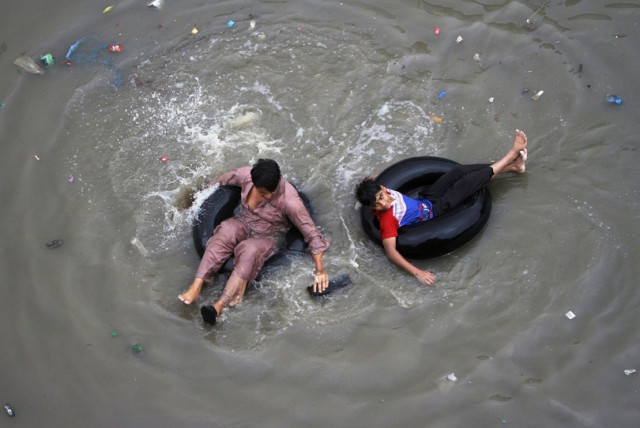Reducing risks: ‘Do your part, don’t wait for the govt to give you a hand’
Students of IoBM hold seminar to get insight on preventive measures for floods.

File photo of boys using inner tubes to keep afloat as they play in flood waters in Karachi. PHOTO: REUTERS
On the pursuit of completing a ten-mark project, these business students stepped out of classrooms to understand social responsibility. The students of Masters in Business Administration (MBA) enrolled in a course titled Public Relations and Corporate Communications, Event Management and Media Management organised the seminar to work out a strategy for ‘preventive management’ in floods.
The essence of the seminar was written on the banners at the IoBM: While crisis management is important, preventive management is vital.
Losses borne
Hira Alavi, part of the 12-member organising committee, briefed the audience on the devastation brought by floods this year. She said that 98 lives were lost, while 100,000 lives and 380,000 acres were affected and about 180,000 acres of crops were completely damaged.

Parvez Jamil, the teacher of the 72-student class and the man behind the project, opened up the forum with the million-dollar question, “How do we manage floods in future?”
Bridging gaps
The institute’s rector, Talib Kareem, pushed people to govern their matters themselves. “The government cannot do everything, people also have to contribute,” he claimed. Before inviting the commissioner to the rostrum, he remarked, “This area has two refineries, five universities, many schools and some industrial units but we do not have a bridge.” He requested the commissioner to construct either an underpass or a bridge as the crossing that chokes up the traffic for hours.
Blocking drains
“We make good plans but we seldom implement them,” said Karachi Commissioner Shoaib Ahmed Siddiqui, listing lack of preparedness, lack of resources and relying solely on government as reasons. “We litter our roads, careless of the fact that it chokes up our drains,” he said, adding that it also blocks the rainwater from going into the sea.
He told the audience that when visiting the flood-affected areas, they discovered that well-built drains were hidden under buildings and the water could not find an escape route.
Recalling the time when he would drop his daughter to IoBM, he said that they also faced traffic jams. “The work comes under the domain of the Karachi Metropolitan Corporation which is currently facing a financial crunch but now I will personally take it up and build the bridge soon,” he promised.
‘Risk is poverty’
Awami Awaz’s editor, Dr Ayub Sheikh, used his perky humour to get his points across. “They say the disease never existed before the medicine, similarly there were no floods before the Provincial Disaster Management Authority,” he said jokingly. “The risk we are referring to is that there is ghurbat [poverty]. Creating settlements on the nullahs is a crime.”
In his opinion, the government wanted to improve the situation but lacked the will.
Published in The Express Tribune, October 28th, 2013.



















COMMENTS
Comments are moderated and generally will be posted if they are on-topic and not abusive.
For more information, please see our Comments FAQ